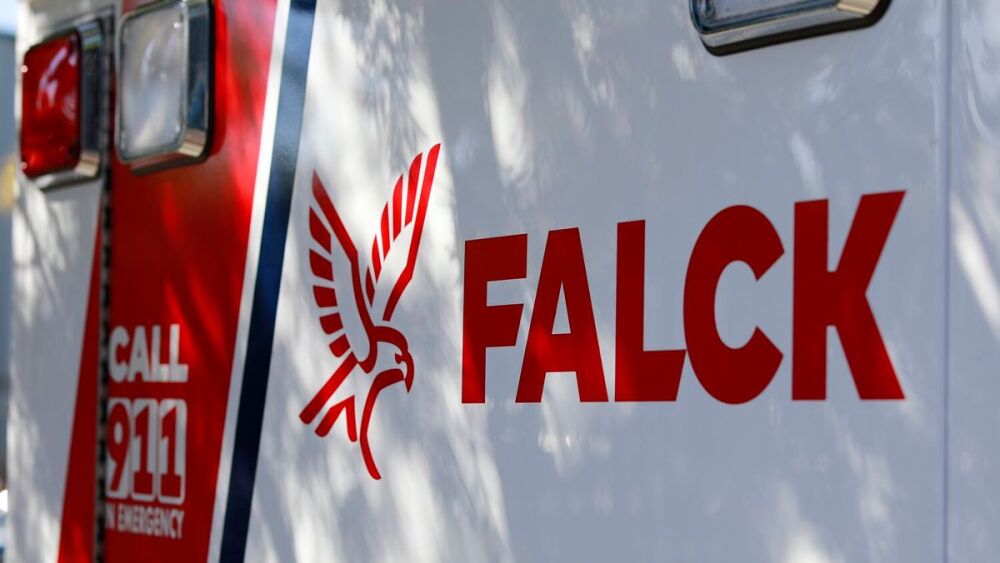By David Garrick
The San Diego Union-Tribune
SAN DIEGO — San Diego and the city’s struggling ambulance provider are discussing big changes including a revamped triage system and adding a second ambulance provider, but officials said Wednesday that negotiations have been slower than expected.
The bold proposals come as Falck USA, which took over ambulance service for San Diego in November 2021, continues to fall far short of the staffing and response-time obligations in its city contract.
The company was fined $900,000 last fall for 119 unacceptable response times and other problems during July, August and September. And response-time data revealed Wednesday for October, November and December look similar.
Fire Chief Colin Stowell briefly summarized Wednesday two solutions he’s been privately discussing with Falck officials this winter, but he declined to provide much detail to the City Council’s Public Safety Committee.
One solution would change how emergency calls are dispatched by separating out non-urgent calls. Ambulances would still go to medical emergencies, but ambulances would not be dispatched to many calls deemed non-urgent.
Stowell said he recently observed such a system in Dallas and was impressed, noting that 8 percent to 15 percent of emergency calls there get re-routed to a “nurse navigator” after being deemed non-urgent.
On adding a second ambulance contractor, Stowell said he believes that is key to solving the city’s problems with Falck and its emergency medical system.
“It gives the current workforce a break, it allows us to stabilize the system and truly assess” the number of ambulances needed and how many hours they need to be on the road each day, Stowell said.
American Medical Response, which handled ambulance service for San Diego until city officials replaced the company with Falck 14 months ago, said Wednesday that the company is willing to consider subcontracting with Falck.
“AMR San Diego is willing to participate in any discussions relating to the improvement of emergency medical system service delivery in the city of San Diego,” the company said in a prepared statement.
The City Council replaced AMR with Falck based on the latter’s promises of significantly more ambulances and shorter response times. The company hasn’t delivered on those promises.
Stowell said a deal with Falck on subcontracting can’t be finalized until both sides agree to a prohibition against subcontracting in Falck’s deal with the city.
In addition, Falck would have to reach a new labor deal with the paramedics and emergency medical technicians who work on the ambulances the company deploys in the city.
Officials from Falck and the labor union representing those workers both expressed optimism Wednesday that a deal is close.
“While we have not yet reached an agreement, we are hopeful the parties can achieve a multi-year contract that will provide competitive wages and correct the understaffing that has plagued this operation,” said Tony Sorci, leader of the union.
“We are close to an agreement that will bring more competitive wages to our hard-working employees,” said Jeff Behm, who leads Falck’s operations in San Diego.
Behm also said Falck has been a willing participant in negotiations with the city on big operational changes.
“Falck continues to work collaboratively with the Fire Department to look at innovative and evolutionary ways to improve the EMS system: triage protocols at the 9-1-1 call-taking process, improved use of EMS assets and a collaborative plan to enhance the number of EMS units responding into the city,” he said.
Stowell was scheduled to present a finalized proposal for big changes to the Public Safety Committee for approval Wednesday, but he said that won’t happen until February.
Marni von Wilpert, chairperson of the committee, said she is OK with the delay.
“I understand it’s taking a little more time than we thought,” she told Stowell. “I’d rather have it done more thoroughly than rushed. I appreciate the need for extra time — it’s a complex contract.”
But von Wilpert said it’s also crucial that things with Falck get fixed.
“We can’t continue to operate this way,” she said. “It’s been over a year now and we’ve never gotten the full unit hours or staffing levels that we need. We have patients that are being carried to hospitals on fire trucks and that is not acceptable.”
Von Wilpert praised plans to add a second ambulance company and to revamp dispatch procedures.
“The Fire Department does need to take control of the dispatch system and how we assign units,” she said.
This story originally appeared in San Diego Union-Tribune.
___
©2023 The San Diego Union-Tribune.
Visit sandiegouniontribune.com.
Distributed by Tribune Content Agency, LLC.












